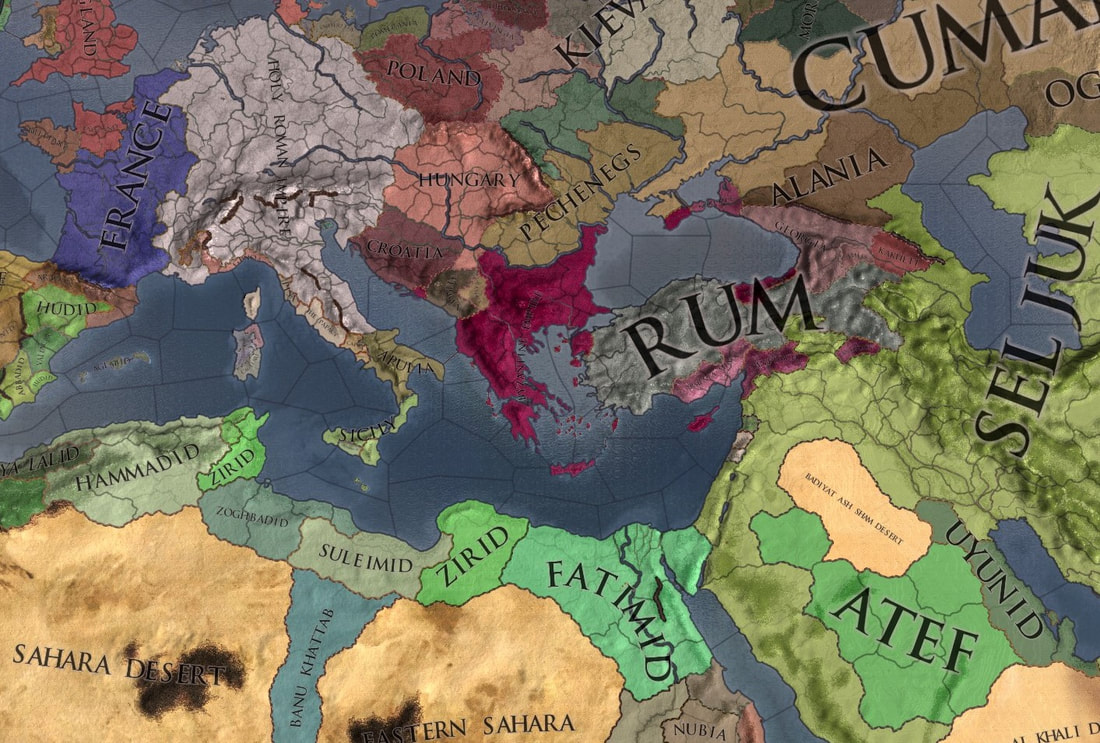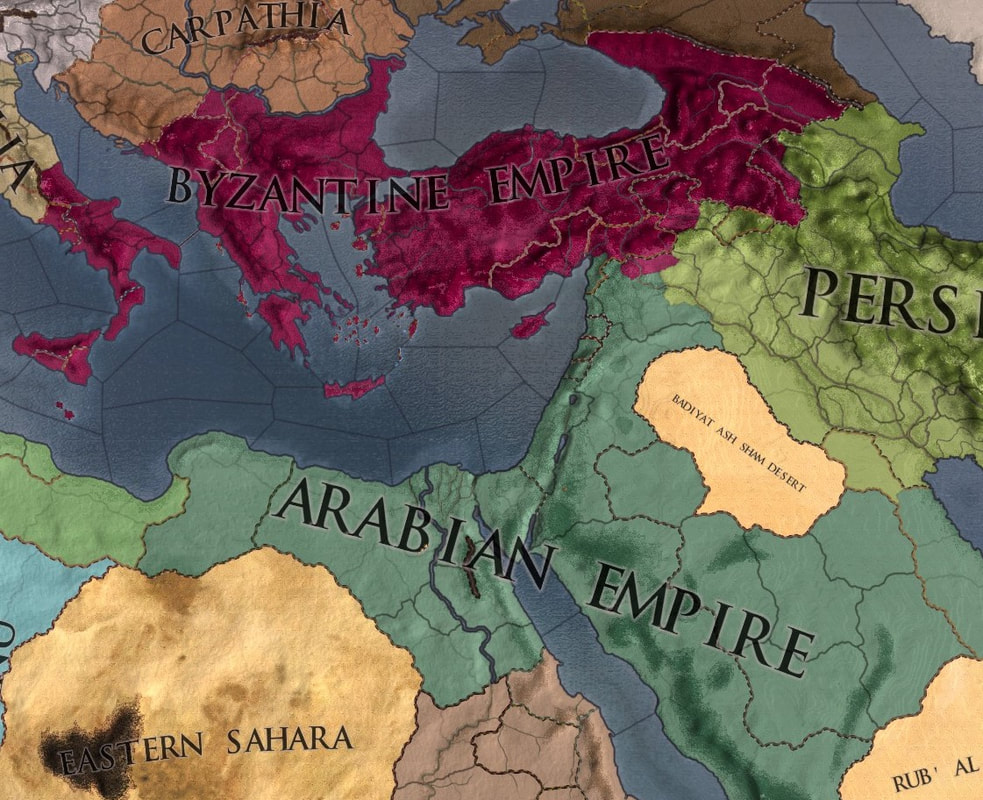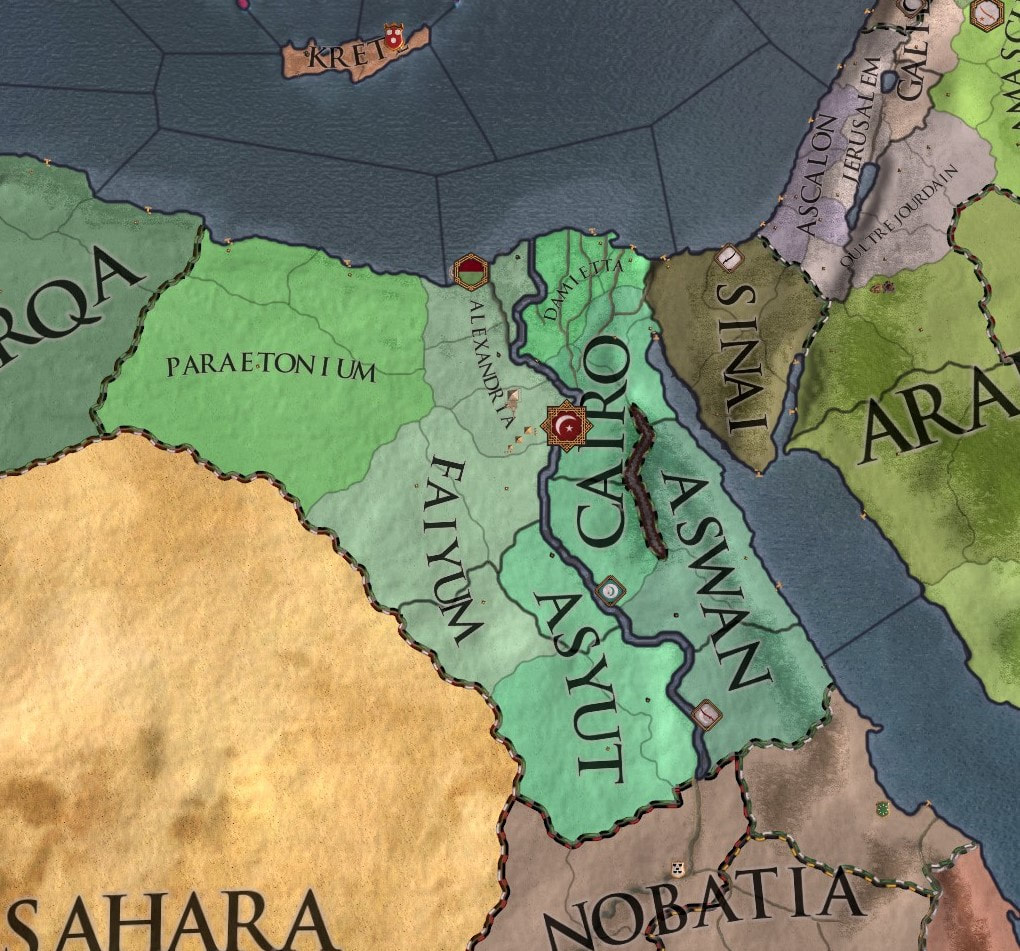The Conclave
|
Roll-off and faction selection: 27 Jun, 8:00pm EST
First Session: 30 Jun, 7:00pm EST |
Sundays 19:00 - 22:00 EST
Discord: https://discordapp.com/invite/mvD8vAR Twitch: https://www.twitch.tv/officialmrscruff/ |
Setting - 1081 to 1300 A.D. (Approx 10 sessions/weeks at speed 2)
This campaign focuses on three factions, the Catholic French, Orthodox Byzantones, and Shia Egyptians, competing against the Seljuk empire and each other for control of the Eastern Mediterranean.
This campaign focuses on three factions, the Catholic French, Orthodox Byzantones, and Shia Egyptians, competing against the Seljuk empire and each other for control of the Eastern Mediterranean.
Campaign Rules
1. Restricted Actions - Various anti-cheese rules that will be enforced to allow the most fun for the most players and a some notable in-game rule options that are being utilized.
- Player-controlled characters that have a empire-rank title may not create any other empire-rank or kingdom-rank titles. Any titles created in this way will be destroyed, and the offending character will have at least one of their highest titles given away to a courtier as penalty.
- Matrilinear Marriage Restriction - Only Matriarchs and female Heirs age 16 or older are allowed to use or accept Matrilinear Marriages. This means that if the character does not have the 'star' or 'crown' symbols (identifying the player and heir respectively) then you may not use or accept a Matrilinear Marriage for them and Matrilinear Betrothal are never allowed for any character. Any family discovered to violate this rule will be suitably culled to remove any benefit gained.
- Assassination of other players and immediate family members will be unavailable by in-game rules. This does not prevent you from being assassinated by the AI or participating in AI assassination plots.
- Demesne and Vassal limits have been decreased by half by in-game rules, to provide a more interesting challenge to the most powerful players.
- Crusades and Jihads may not be chosen to target Thrace, Greece, or Egypt, and if one occurs independent of player actions against any of these kingdoms, no players may offer to join or accept requests to join.
4. Dynasty Patriarch/Matriarch - Rules for switching characters within your dynasty.
The character controlled by each player will be considered the Patriarch of their dynasty. At the start of any session or rehost, a player may choose to control any member of his dynasty instead of the character he ended as on that save point, therefore changing his Patriarch. Any player knocked out of the game may rejoin at the next rehost opportunity as any member of their dynasty.
5. Faction Selection - Selection order will be based on player ranking in the previous campaign or randomized at the end if a player has no campaign history. Starting Patriarchs and Dynasties will be designed using the Ruler Designer.
6. Dynasty Reset - Restart rules. Hopefully you will not need these.
At the end of any session, a player may ask to have his Dynasty 'reset' to his his starting provinces: All landed members of the Dynasty will give up their titles to a randomly created courtier and the youngest living member of the Dynasty will be given the initial starting Dynasty titles, no matter their current owners. The titles will remain in vassalage within their current feudal hierarchy, favoring the primary title.
7. Player Tiers - There are no tiers this campaign and score ranking will be in a single group, but separate title rewards will be reserved for the top scores from each starting dynasty group.
8. Pro-Tips for noobs.
- Just because the game says you can create or usurp a title does not mean you should. Make sure you understand how your inheritance laws will handle this new title and it will affect your vassal opinions.
- Take care when granting titles to your primary heir, you cannot continue as a character unless you pass along at least one title to them on death.
- Offensive wars quickly create a public opinion malus in all your provinces. Bad public opinion fuels revolts.
- Player-controlled characters that have a empire-rank title may not create any other empire-rank or kingdom-rank titles. Any titles created in this way will be destroyed, and the offending character will have at least one of their highest titles given away to a courtier as penalty.
- Matrilinear Marriage Restriction - Only Matriarchs and female Heirs age 16 or older are allowed to use or accept Matrilinear Marriages. This means that if the character does not have the 'star' or 'crown' symbols (identifying the player and heir respectively) then you may not use or accept a Matrilinear Marriage for them and Matrilinear Betrothal are never allowed for any character. Any family discovered to violate this rule will be suitably culled to remove any benefit gained.
- Assassination of other players and immediate family members will be unavailable by in-game rules. This does not prevent you from being assassinated by the AI or participating in AI assassination plots.
- Demesne and Vassal limits have been decreased by half by in-game rules, to provide a more interesting challenge to the most powerful players.
- Crusades and Jihads may not be chosen to target Thrace, Greece, or Egypt, and if one occurs independent of player actions against any of these kingdoms, no players may offer to join or accept requests to join.
4. Dynasty Patriarch/Matriarch - Rules for switching characters within your dynasty.
The character controlled by each player will be considered the Patriarch of their dynasty. At the start of any session or rehost, a player may choose to control any member of his dynasty instead of the character he ended as on that save point, therefore changing his Patriarch. Any player knocked out of the game may rejoin at the next rehost opportunity as any member of their dynasty.
5. Faction Selection - Selection order will be based on player ranking in the previous campaign or randomized at the end if a player has no campaign history. Starting Patriarchs and Dynasties will be designed using the Ruler Designer.
6. Dynasty Reset - Restart rules. Hopefully you will not need these.
At the end of any session, a player may ask to have his Dynasty 'reset' to his his starting provinces: All landed members of the Dynasty will give up their titles to a randomly created courtier and the youngest living member of the Dynasty will be given the initial starting Dynasty titles, no matter their current owners. The titles will remain in vassalage within their current feudal hierarchy, favoring the primary title.
7. Player Tiers - There are no tiers this campaign and score ranking will be in a single group, but separate title rewards will be reserved for the top scores from each starting dynasty group.
8. Pro-Tips for noobs.
- Just because the game says you can create or usurp a title does not mean you should. Make sure you understand how your inheritance laws will handle this new title and it will affect your vassal opinions.
- Take care when granting titles to your primary heir, you cannot continue as a character unless you pass along at least one title to them on death.
- Offensive wars quickly create a public opinion malus in all your provinces. Bad public opinion fuels revolts.
Scoring
Interval Scoring (unless otherwise specified, all references to kingdom titles also apply to empire titles)
These points can be gained during scoring that will take place at 1100 AD and every 25 years afterword. The game will end at 1000 AD.
- Score gained at 1200, 1225, 1250, 1275 will be multiplied by 2.
- Score gained at 1300 will be multiplied by 3.
1. Influence - Players gain 10 points per duchy title within the de jure Byzantine or Arabian Empires held by any member of their dynasty. Any Patriarch or dynasty members of a different religion than that dynasty's starting religion are ignored for scoring (heresies count as their parent religion, so its alright to be a heretic).
Advice: Get as many duchy titles in for your dynasty as you can in the scoring regions. Titles outside of these regions can still be valuable for levies and taxes, but will be worth no points.
2. Leadership - Any member of a player's dynasty with a kingdom or empire title, does not gain points for duchy titles held by himself or dynasty members within that kingdom, but will instead gain 10 points for every duchy title that is de facto and directly under that title and not held by another player's dynasty (meaning if an emperor creates a kingdom title and grants it to another dynasty, the emperor's dynasty will no longer be able to receive points from any duchies in that kingdom). Any duchy titles outside of the de jure Byzantine or Arabian Empires are ignored and any Patriarch or dynasty members of a different religion than that dynasty's starting religion are ignored for scoring.
Advice: Being a king or emperor is very rewarding, and easier if you work with other players, but if you work with others you will have to share the rewards.
3. Council - A Patriarch who is a council member of any kingdom or empire will gain 20 points for his dynasty (including AI courts), and a Patriarch with a kingdom or empire title will gain 10 points for each other player's Patriarch on his council (including the Adviser position). Patriarchs will also gain (or lose) points equal to the relations effect of any minor titles they hold within a kingdom or empire's court.
Advice: Kings can use council membership to reward helpful vassals while also usually keeping them out of troublesome factions, but the players will get to vote on some of your actions, and even the council can join factions if you choose to go against their votes, or when a new heir has recently taken the throne. Vassal players will have to choose if they think participating in the council is worth losing the ability to join factions. Minor titles, however, are rewards the king can hand out with relatively free strings attached.
4. Protector of the Holy Land - Points from Influence, Leadership, and Council are doubled for all titles that are de facto part of the realm that holds Jerusalem. However, a dynasty's points will not be doubled if the religion of the realm's ruler does not match the religion of the dynasty's Patriarch.
Advice: You can double your score by helping your realm hold Jerusalem, but is it worth it if others are benefiting from it more than you? Is your king sharing the glory? If you disagree with your share of the score, consider leaving the kingdom and joining with others to form a new realm or joining a faction to reign in the king's power and redistribute some points.
Immediate Scoring
These points can be gained immediately upon completing the described goal. Please pause the game and alert the host if needed.
6. Founding - Any Patriarch who creates (or is awarded by Crusade) a kingdom title within the de jure Byzantine or Arabian Empires will gain 200 points, the first player Patriarch to create the kingdom of Jerusalem will instead gain 300 points. A dynasty can only claim points from Founding once.
Advice: Independence is generally great, but it may exclude you from being part of the realm that holds Jerusalem.
7. Conquest - Any Patriarch who usurps a kingdom title of the de jure Byzantine or Arabian Empires held by another player's dynasty will gain 100 points and the previously owning dynasty will lose 100 points. The first Patriarch to claim a Conquest reward will instead earn 200 points. All Conquest point values after 1200 AD will be multiplied by 2.
Advice: Usurping a kingdom title can be done from within a kingdom, through factions and claims on the throne, or from without through conquest.
8. Intrigue - Any war or in-game demand that deposes a reigning king of a player's dynasty (or causes them to abdicate) will gain 50 points for the dynasties of any Patriarchs who initiated the war or demands, were members of the faction involved when demands are made, or joined the rebellious side in any related war (including Patriarchs from outside the kingdom, although any Patriarch who also has a kingdom title is excluded from gaining these points). This will also deduct 50 points from the dynasty of the king and deduct 20 points from the dynasty of any loyalist Patriarchs within the kingdom. A Patriarch is considered a loyalist if they were not a member of the related faction, were not an allied participant of the rebels during the related war, and does not have an alliance with the war-leader or demand issuer at the time of abdication (regardless of ability to participate in any related war). If Intrigue points are claimed by placing a new ruler on the throne of a kingdom, Patriarchs in that kingdom cannot gain or lose points from Intrigue for the next 10 years after crowning the new king, otherwise the only restrictions are from truce timers. A faction that successfully increases Council Power against a king of a player's dynasty, through demands or war, will award and deduct points in the same way. All Intrigue point values after 1200 AD will be multiplied by 2.
Advice: A king can easily be overwhelmed by a few unruly vassals, so don't hesitate to milk these points out of your liege if he is being stingy with the titles, but loyalists can also meddle on the king's behalf for the right promises, since their armies will always be hostile to rebel armies, even if they are not directly allied to the king.
Rewards:
- Prestige divided by tier as in the EU campaigns.
- Titles:
Top score in the Romans group -
Top score in The Egyptians group -
Top score in The French group -
These points can be gained during scoring that will take place at 1100 AD and every 25 years afterword. The game will end at 1000 AD.
- Score gained at 1200, 1225, 1250, 1275 will be multiplied by 2.
- Score gained at 1300 will be multiplied by 3.
1. Influence - Players gain 10 points per duchy title within the de jure Byzantine or Arabian Empires held by any member of their dynasty. Any Patriarch or dynasty members of a different religion than that dynasty's starting religion are ignored for scoring (heresies count as their parent religion, so its alright to be a heretic).
Advice: Get as many duchy titles in for your dynasty as you can in the scoring regions. Titles outside of these regions can still be valuable for levies and taxes, but will be worth no points.
2. Leadership - Any member of a player's dynasty with a kingdom or empire title, does not gain points for duchy titles held by himself or dynasty members within that kingdom, but will instead gain 10 points for every duchy title that is de facto and directly under that title and not held by another player's dynasty (meaning if an emperor creates a kingdom title and grants it to another dynasty, the emperor's dynasty will no longer be able to receive points from any duchies in that kingdom). Any duchy titles outside of the de jure Byzantine or Arabian Empires are ignored and any Patriarch or dynasty members of a different religion than that dynasty's starting religion are ignored for scoring.
Advice: Being a king or emperor is very rewarding, and easier if you work with other players, but if you work with others you will have to share the rewards.
3. Council - A Patriarch who is a council member of any kingdom or empire will gain 20 points for his dynasty (including AI courts), and a Patriarch with a kingdom or empire title will gain 10 points for each other player's Patriarch on his council (including the Adviser position). Patriarchs will also gain (or lose) points equal to the relations effect of any minor titles they hold within a kingdom or empire's court.
Advice: Kings can use council membership to reward helpful vassals while also usually keeping them out of troublesome factions, but the players will get to vote on some of your actions, and even the council can join factions if you choose to go against their votes, or when a new heir has recently taken the throne. Vassal players will have to choose if they think participating in the council is worth losing the ability to join factions. Minor titles, however, are rewards the king can hand out with relatively free strings attached.
4. Protector of the Holy Land - Points from Influence, Leadership, and Council are doubled for all titles that are de facto part of the realm that holds Jerusalem. However, a dynasty's points will not be doubled if the religion of the realm's ruler does not match the religion of the dynasty's Patriarch.
Advice: You can double your score by helping your realm hold Jerusalem, but is it worth it if others are benefiting from it more than you? Is your king sharing the glory? If you disagree with your share of the score, consider leaving the kingdom and joining with others to form a new realm or joining a faction to reign in the king's power and redistribute some points.
Immediate Scoring
These points can be gained immediately upon completing the described goal. Please pause the game and alert the host if needed.
6. Founding - Any Patriarch who creates (or is awarded by Crusade) a kingdom title within the de jure Byzantine or Arabian Empires will gain 200 points, the first player Patriarch to create the kingdom of Jerusalem will instead gain 300 points. A dynasty can only claim points from Founding once.
Advice: Independence is generally great, but it may exclude you from being part of the realm that holds Jerusalem.
7. Conquest - Any Patriarch who usurps a kingdom title of the de jure Byzantine or Arabian Empires held by another player's dynasty will gain 100 points and the previously owning dynasty will lose 100 points. The first Patriarch to claim a Conquest reward will instead earn 200 points. All Conquest point values after 1200 AD will be multiplied by 2.
Advice: Usurping a kingdom title can be done from within a kingdom, through factions and claims on the throne, or from without through conquest.
8. Intrigue - Any war or in-game demand that deposes a reigning king of a player's dynasty (or causes them to abdicate) will gain 50 points for the dynasties of any Patriarchs who initiated the war or demands, were members of the faction involved when demands are made, or joined the rebellious side in any related war (including Patriarchs from outside the kingdom, although any Patriarch who also has a kingdom title is excluded from gaining these points). This will also deduct 50 points from the dynasty of the king and deduct 20 points from the dynasty of any loyalist Patriarchs within the kingdom. A Patriarch is considered a loyalist if they were not a member of the related faction, were not an allied participant of the rebels during the related war, and does not have an alliance with the war-leader or demand issuer at the time of abdication (regardless of ability to participate in any related war). If Intrigue points are claimed by placing a new ruler on the throne of a kingdom, Patriarchs in that kingdom cannot gain or lose points from Intrigue for the next 10 years after crowning the new king, otherwise the only restrictions are from truce timers. A faction that successfully increases Council Power against a king of a player's dynasty, through demands or war, will award and deduct points in the same way. All Intrigue point values after 1200 AD will be multiplied by 2.
Advice: A king can easily be overwhelmed by a few unruly vassals, so don't hesitate to milk these points out of your liege if he is being stingy with the titles, but loyalists can also meddle on the king's behalf for the right promises, since their armies will always be hostile to rebel armies, even if they are not directly allied to the king.
Rewards:
- Prestige divided by tier as in the EU campaigns.
- Titles:
Top score in the Romans group -
Top score in The Egyptians group -
Top score in The French group -
|
World of the Conclave
1081 Anno Domini |
Scoring Regions of the Conclave
The Byzantine and Arabian Empires |
Factions of the Conclave
1. Selection order is based on player ranking in the previous campaign or randomized at the end if a player has no campaign history.
2. Players my choose to play in any starting faction, and may choose to play as either the ruler of that faction, with only the capital county in their demesne, or a duke of that realm with all counties of the duchy of their choice in their demesne. If not all of a chosen duchy is held by their realm at the start date, players will only get the counties currently within the realm (Right-click and open maps below in a new window to zoom in)..
3. Players will design their initial Patriarch and Dynasty with the Ruler Designer.
4. Players may pursue independence, rebellion, usurpation, cooperation or any method they desire in the interest of their score, and have no obligation to their starting faction once the game begins.
1. Selection order is based on player ranking in the previous campaign or randomized at the end if a player has no campaign history.
2. Players my choose to play in any starting faction, and may choose to play as either the ruler of that faction, with only the capital county in their demesne, or a duke of that realm with all counties of the duchy of their choice in their demesne. If not all of a chosen duchy is held by their realm at the start date, players will only get the counties currently within the realm (Right-click and open maps below in a new window to zoom in)..
3. Players will design their initial Patriarch and Dynasty with the Ruler Designer.
4. Players may pursue independence, rebellion, usurpation, cooperation or any method they desire in the interest of their score, and have no obligation to their starting faction once the game begins.
|
The Romans
The Empire of Byzantium Orthodox The Basileus - County of Constantinople Strategos of ? - Choose any entire Duchy Strategos of ? - Choose any entire Duchy Strategos of ? - Choose any entire Duchy Strategos of ? - Choose any entire Duchy |
The Egyptians
The Sultanate of Egypt Shia The Caliph - County of Cairo Emir of ? - Choose any entire Duchy Emir of ? - Choose any entire Duchy Emir of ? - Choose any entire Duchy Emir of ? - Choose any entire Duchy |
The French
The Kingdom of France Catholic The King - County of Paris Duke of ? - Choose any entire Duchy Duke of ? - Choose any entire Duchy Duke of ? - Choose any entire Duchy Duke of ? - Choose any entire Duchy |








